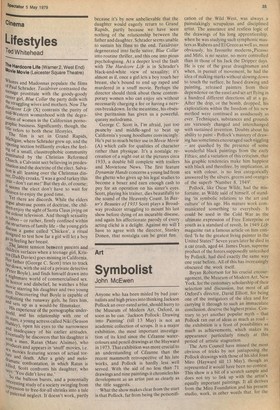Cinema
Lifestyles
Ted Whitehead
The Hardcore Life (Warner 2, West End) 41°Iiie Movie (Leicester Square Theatre) Whores and Madonnas populate the films of Paul Schrader. Taxidriver contrasted the teenage prostitute with the goody-goody career girl, Blue Collar the party dolls with the struggling wives and mothers. Now The Hardcore Life (X) contrasts the purity of laid-Western womanhood with the degradation of women in the Californian pornographic business. Significantly, though, the title refers to both these lifestyles. „The film is set in Grand Rapids, Michigan, where Schrader grew up, and the °. Pening section brilliantly evokes the feeling f a small, claustrophobic community ,..,uominated by the Christian Reformed `-hurch, a Calvinist sect believing in predestination and the doctrine of the elect. Salvation is all: leaning over the Christmas dinner, Daddy croaks, 'I was a good turkey this Year-don't eat me!' But they do, of course; I,t seems the elect don't have to wait for 'leaven to enjoy the good time. Yet there are discords. While the elders argue abstruse points of doctrine, the children e-!_ y the sight of Santa Claus jiving on h iv ,t4e colour television. And though sexuality is taboo or rather, firmly confined within the structures of family life the young girls discuss a game called 'Chicken', a ritual designed to test how far a girl will let a boy g° in feeling her breast. The latent tension between parents and Children surfaces when a teenage girl, Kris(Ilah Davies) goes missing in California. "IL er father (George C. Scott) tries to track (Peter down, with the aid of a private detective tPeter Boyle), and finds himself drawn into a nightmare world of commercialised sex. In horror and disbelief, he watches a blue movie starring his daughter and two young men. Discovering that Boyle is capable of and the runaway girls, he fires him, "d sets up as a would-be filmmaker.
, experience of the pornographic under:world, and his relationship with one of stars, a young actress called Niki (Season ubleY), open his eyes to the narrowness and inadequacy of his earlier attitudes. eventually he discovers that his daughter is with a man, Ratan (Marc Alaimo), who ,Produces and appears in 'snuff movies, i.e. movies featuring scenes of actual tordUre and death. After a grisly and melodramatic confrontation, in which Ratan is killed Scott confronts his daughter, who 4Y5: 'You didn't love me.' So the balloon bursts, and a potentially 'nteresting study of a society swinging from (repression to free-for-all shrinks into a tale )1 Paternal neglect. It doesn't work, partly because it's by now unbelievable that the daughter would eagerly return to Grand Rapids, partly because we have seen nothing of the relationship between the father and daughter. Schrader seems unable to sustain his films to the end. Taxidriver degenerated into facile satire, Blue Collar into routine thriller, and this one into pious psychologising. At a deeper level the fault with The Hardcore Life is in Schrader's black-and-white view of sexuality; it's almost as if, once a girl lets a boy touch her breast, she's bound to end up raped and murdered in a snuff movie. Perhaps the director should think about those contemporary women who can enjoy sex without necessarily charging a fee or having a nervous breakdown. In the meantime, his obsessive puritanism has given us a powerful, queasy melodrama.
George C. Scott is, I'm afraid, just too paunchy and middle-aged to beat up California's young hoodlums convincingly. He's put to much better use in Movie Movie (A) which calls for qualities of character rather than physique. It's a nostalgic recreation of a night out at the pictures circa 1933, a double bill complete with trailers and Movietone News. The first feature Dynamite Hands concerns a young lad from the ghetto who gives up his legal studies to become a boxer and earn enough cash to pay for an operation on his sister's eyes. Scott, playing his trainer, dies beautifully to the sound of the Heavenly Count. In Baxter's Beauties of 1933 Scott plays a Broadway producer struggling to mount his last show before dying of an incurable disease, and again his affectionate parody of every acting cliché is a delight. Against my will I have to agree with the director, Stanley Donen, that nostalgia can be great fun.










































 Previous page
Previous page